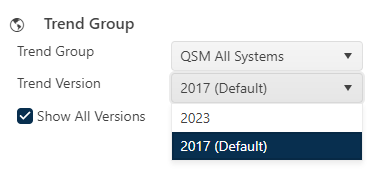
In addition to changing the trend group, you can also
change the trend group version (example: QSM Business 2017 vs. QSM Business
2023). The trend group version is like an edition for a book. It allows
the Back Office administrator to update existing trend groups over time to
reflect the latest data available. If you have custom trends with multiple
versions, or if your Back Office administrator has uploaded an older or newer
release of the QSM trend lines, they will be available for selection by projects
and templates. To see all trend versions when you expand the trend group
selection list, check the Show All Versions checkbox to the left of the
drop-down trend selection list box.

The default version of each trend group can be
identified by the (Default) label immediately after the trend group name.
Templates can be set up to use the default (generally, the most recent) version
of a trend or a specified version (example: 2017 QSM Business). Since
different trend versions reflect different samples of projects and have
different statistics, changing the trend version associated with a project has
the same effect as changing the trend group itself.
•Estimation projects. Selecting a new trend group will affect any solution that draws inputs from the project’s trend group:
o Trend based solution. This solution method draws average phase 3 time and effort values from the project’s trend group at a given size. Since each trend group has its own effort and schedule data, changing the trend will cause the current solution, Balanced Risk solution, and any logged solutions that use the Trend Based solution method to be recalculated.
o Solutions that use PI Rank
or Size Bin inputs. For solutions that use the PI Rank or Size Bin methods
to calculate productivity or sizing inputs based on “bins” from the project’s
trend group, these inputs will be updated if the trend group is changed. While
your current size bin or rank (e.g., Medium or Average) value will not change,
the associated size or PI value for each bin or rank will necessarily change
when the data it is based on changes because each trend group has a unique set
of statistics and metric averages.
•Closeout projects. Since the productivity index (PI) for completed projects is calculated from the actual phase 3 time, phase 3 effort, and effective size data you enter on the Actual Data tab, changing the trend group will ONLY affect the project’s position on trend charts and the five star performance rating for the project.